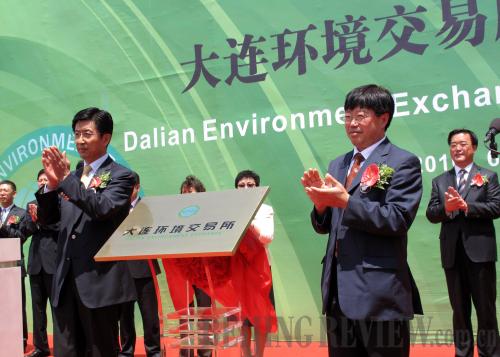|
 |
|
LOW-CARBON ENDEAVOR: The first environment equities exchange in northeast China—the eighth nationwide—opens in Dalian on June 2, 2010. The exchange attempts to promote energy saving, emission reduction and the development of a low-carbon economy (YAN PING) |
China may have impressed the world with its rapid recovery that helped lead the global economy out of the financial storm, but now economists with a growing fear of imminent inflation are calling for a gradual exit from the country's massive stimulus plan.
Still, whether, when and how China should withdraw these incentives has become an intricate issue for the Chinese Government.
Against this backdrop, officials from China's financial supervisory body met experts and scholars with related international organizations to diagnose feverish financial topics and economic growth at the China Finance Summit 2010 in Beijing on May 27-28.
Obstacles
Although, optimistic about China's economic prospects, participants expressed concerns over the negative aspects of the world recovery.
On the macroeconomic front, China faces two challenges: growing inflation sentiment accompanying the country's overheated growth and the crisis sweeping Europe, said Ha Jiming, chief economist of China International Capital Corp. Ltd.
While the European debt crisis is a strictly external issue, economic overheating and inflation in China are more controllable, especially after a series of macro-control measures were introduced in mid-April.
The fallout from the euro-zone debt crisis, Ha said, will affect China and the world economy in four ways: a depreciating euro will inevitably lead to an appreciating yuan, hindering China's exports to Europe; fiscal austerity measures in some European countries will affect demand for Chinese products; financial indicators showing signs of credit and monetary tightening worldwide are reminiscent of the scenario before Lehman Brothers' collapse; and the crisis may also affect the economic growth of China's large trade partners and hence stifle China's exports and imports, he said.
The euro's depreciation against U.S. and Japanese currencies, for instance, will slow down U.S. and Japanese export growth and cause a ripple effect throughout China's export industry, he said.
Japan, the United States and the EU are China's top three trade partners.
And as Greek sovereign debt woes spread to involve more European countries and aggregate uncertainties in global financial and economic prospects, factors of uncertainty affecting the steady development of China's capital market have increased, said Liu Xinhua, Vice Chairman of China Securities Regulatory Commission (CSRC). The CSRC is on alert as Europe's debt crisis evolves and will deploy timely measures to cushion the impact if necessary.
At the same time, the CSRC is devoted to improving the market system and reinforcing supervision to ensure the smooth and sound development of China's capital market, Liu said.
China also faces a stern test with its economic structure adjustment, said Gong Fangxiong, CEO of JP Morgan Chase Pacific.
Now, the Chinese Government is accelerating economic structural adjustments and transforming the country's economic growth pattern in the wake of the financial crisis. It has also urged other countries to rethink problems within their own economies.
Business reengineering and innovation in the financial sector will accompany China's pursuit of green growth, said Gong.
While the global recession will continue for some time, China remains steadfast in its commitment to following a consumption- and service-driven growth pattern instead of the three-decade-old investment- and export-propelled growth model.
And a flourishing private economy will help expand domestic consumption and boost the service sector, Gong said.
The reform of China's financial sector, financial innovations, in particular, will help address bottlenecks to private businesses' financing.
China's ability to attain the goal for its economic growth pattern transformation hinges on the further development, breakthrough and innovation in the country's overall capital market, Gong said.
These efforts will help diversify financing channels and enlarge the capital pool for the market, and will especially provide a financing platform for the development of small private businesses, Gong said.
Solution
The world has witnessed a surge of enthusiasm for low-carbon economic growth after the global financial crisis, which has fueled the development of carbon finance, defined as financial services supporting low-carbon economic development, said Deng Gang, Senior Manager of Credit Risk with Huaxia Bank.
| 